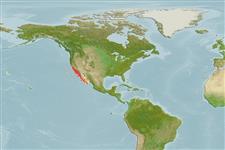Elasmobranquios (tiburones y rayas) (sharks and rays) >
Carcharhiniformes (Ground sharks) >
Pentanchidae (Deepwater catsharks)
Etymology: Apristurus: a-, Latin privative, i.e., without; pristis, from pristes (Gr.), sawyer (but here meaning saw); oura (Gr.), tail, referring to absence of saw-toothed crest of enlarged dermal denticles along upper edge of caudal fin as found in the closely related Pristiurus (=Galeus) (See ETYFish); kampae: In honor of Elizabeth Kampa Boden (1922-1986), Scripps Institution of Oceanography, chief scientist aboard the research vessel Argos, from which holotype was collected (See ETYFish).
Eponymy: Dr Elizabeth Maitland Boden née Kampa (1922–1986) was an oceanographer who was chief scientist on board the research vessel ‘Argos’ (1970) from which the type specimen was collected. [...] (Ref. 128868), visit book page.
Environment: milieu / climate zone / depth range / distribution range
Ecología
marino batidemersal; rango de profundidad ? - 1888 m (Ref. 58018). Deep-water; 38°N - 23°N
Eastern Central Pacific: central and southern California, USA and Gulf of California. A report of a specimen from the Galapagos may be another species of uncertain identity (Ref. 6478) or a conspecific of this species.
Tamaño / Peso / Age
Maturity: Lm ? range ? - ? cm
Max length : 58.4 cm TL macho / no sexado; (Ref. 244); 52.0 cm TL (female)
Found on the eastern Pacific upper continental slope. Oviparous, with a single egg laid per oviduct.
Life cycle and mating behavior
Madurez | Reproducción | Puesta | Huevos | Fecundidad | Larva
Oviparous, paired eggs are laid. Embryos feed solely on yolk (Ref. 50449).
Compagno, L.J.V., 1984. FAO Species Catalogue. Vol. 4. Sharks of the world. An annotated and illustrated catalogue of shark species known to date. Part 2 - Carcharhiniformes. FAO Fish. Synop. 125(4/2):251-655. Rome: FAO. (Ref. 244)
IUCN Red List Status (Ref. 130435: Version 2024-1)
Threat to humans
Harmless
Human uses
Pesquerías: pesquerías de subsistencia
Herramientas
Special reports
Download XML
Fuentes de Internet
Estimates based on models
Preferred temperature (Ref.
123201): 4.5 - 8.8, mean 5.4 °C (based on 20 cells).
Phylogenetic diversity index (Ref.
82804): PD
50 = 0.5000 [Uniqueness, from 0.5 = low to 2.0 = high].
Bayesian length-weight: a=0.00355 (0.00175 - 0.00721), b=3.08 (2.90 - 3.26), in cm total length, based on LWR estimates for this (Sub)family-body shape (Ref.
93245).
Nivel trófico (Ref.
69278): 3.9 ±0.4 se; based on size and trophs of closest relatives
Resiliencia (Ref.
120179): Muy bajo, población duplicada en un tiempo mínimo superior a 14 años (Fec=2).
Fishing Vulnerability (Ref.
59153): Moderate vulnerability (43 of 100).
